
Research helps stroke survivors in rural areas
Delivering home-based rehabilitative care to stroke survivors in low-resource settings is what Ms Elsje Scheffler aims to achieve with her PhD-research.
Scheffler, a Stellenbosch-based physiotherapist and extraordinary lecturer at the Centre for Rehabilitation Studies (CRS) at the Faculty of Medicine and Health Sciences (FMHS), Stellenbosch University, received close to half a million rand through the Discovery Health Rural Fellowship Award to help her design and test a home-based rehabilitation programme that empowers community health workers (CHW) to deliver rehabilitation services at the primary health care level. She is doing her PhD through the Department of Family and Emergency Medicine at the FMHS.

"Most stroke survivors do not receive any rehabilitation services, and often their caregivers have not received any training on how to care for them, as stroke survivors typically have high levels of dependency," Scheffler explains.
"The lack of training of caregivers, combined with the limited capacity of district rehabilitation services and the contextual barriers limiting access to rehabilitation services perpetuate the stroke survivor's dependency and the burden on caregivers and the health care system."
Despite stroke being a major health issue in the Cape Winelands – the rural setting where Scheffler is conducting her research – there are only 13 rehabilitation professionals in the district and no primary level stroke rehabilitation programme. The 530 CHWs in the district have not received any training in rehabilitation.
For her PhD, Scheffler designed a programme to supplement the skills of CHWs to include basic rehabilitation training which they could transfer to family caregivers of stroke survivors. The Discovery Health Rural Fellowship Award is enabling her to test the viability of this programme.
"I would like to see rehabilitation being better integrated and delivered more appropriately within the primary health care and district health system context to reach all those in need and not only a select few. Considering the paucity of research in the area and the lack of appropriate programmes, there is a need to develop appropriate models of service delivery, focussed rehabilitation programmes for the primary level and to support of the roles of the rehabilitation professional," says Scheffler.
Once finalised, the rehabilitation programme and training resources will be available as a free online resource which can be downloaded, modified for context and used as a free-standing programme or integrated into other programmes for community health workers.
